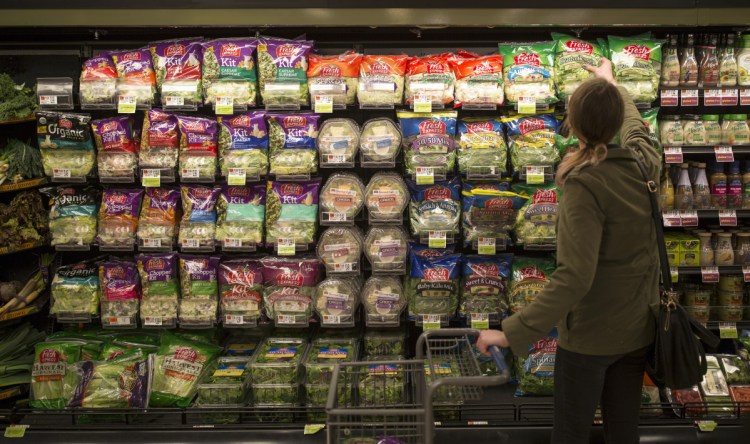Federal officials urged consumers Friday not to buy or eat any romaine lettuce from grocery stores or restaurants without knowing its exact source, after a multistate E. coli outbreak linked to lettuce grown in Yuma, Arizona, was reported by the U.S. Centers for Disease Control and Prevention.
Though there have been no reported E. coli cases from romaine in Maine, New Hampshire or Massachusetts, the Maine Center for Disease Control & Prevention also issued an alert Friday warning about the hazards of eating romaine.
The Maine Department of Agriculture, Conservation and Forestry said E. coli cases that occurred after March 29 likely hadn’t been reported yet to the Maine CDC. “This takes an average of two to three weeks,” the department said in an alert it posted Friday.
E. coli symptoms include “severe stomach cramps, diarrhea and vomiting,” the U.S. CDC said. While most people recover within a week, some infections are severe or life-threatening, the agency said. In rare cases, it can cause hemolytic uremic syndrome, a combination of anemia, acute kidney failure and a low platelet count in the blood.
The U.S. CDC is reporting 53 E. coli cases in 16 states, resulting in 31 people being hospitalized between March 13 and April 6, which is the latest data available.
The agency said Friday that consumers shouldn’t eat romaine lettuce in any form – whole heads, hearts, chopped or in salad mixes – unless they can verify it wasn’t grown in the Yuma area.
“Product labels often do not identify growing regions, so throw out any romaine lettuce if you’re uncertain about where it was grown,” the U.S. CDC advised.
The closest states to Maine that have reported cases of E. coli illness from romaine lettuce are New York and Connecticut, with two cases in each state.
Shaw’s supermarkets began addressing concerns about romaine a week ago, after the U.S. CDC’s initial consumer advisory about packages of chopped romaine from the Yuma growing region, spokeswoman Teresa Edington said.
“This includes removing from sale some product offerings and posting signage,” Edington said. “Our company has changed our source of supply. All bagged salads and other items containing chopped romaine lettuce are now sourced from farms in growing regions not affected by the CDC alert.”
Shaw’s customers who purchased any items containing chopped romaine may return them for a full refund or replacement, Edington said. She didn’t say what steps Shaw’s was taking to address the latest warnings against buying or eating any form of romaine without knowing its source.
At Hannaford supermarkets, some romaine products have been removed from shelves, according to the company’s website, including some varieties of Fresh Express pre-packaged salad mixes, because of a possible connection with Yuma growers. The U.S. CDC has not indicated that any particular brand of salad mixes should be removed.
At the Hannaford near the Maine Mall in South Portland, a sign indicated that the romaine for sale there wasn’t from the Yuma growing area and was safe to buy.
Market Basket has a product recall list on its website, but the list doesn’t include romaine lettuce.
Most of the romaine produced in the United States is grown in California, according to a joint statement issued by the Produce Marketing Association and other lettuce industry groups.
“At this time, no common grower, supplier, distributor or brand has been identified,” the U.S. CDC said. “Consumers anywhere in the United States who have store-bought chopped romaine lettuce at home, including salads and salad mixes containing chopped romaine lettuce, should not eat it and should throw it away, even if some of it was eaten and no one has gotten sick. If you do not know if the lettuce is romaine, do not eat it and throw it away.”
Some retailers, including Sam’s Club and Walmart, have recalled romaine lettuce from their stores as a precautionary measure, even though no brand name has been identified with the outbreak.
Staff Writer Kelley Bouchard contributed to this report.
Joe Lawlor can be contacted at791-6376 or at:
jlawlor@pressherald.com
Twitter: joelawlorph
Send questions/comments to the editors.




Comments are no longer available on this story